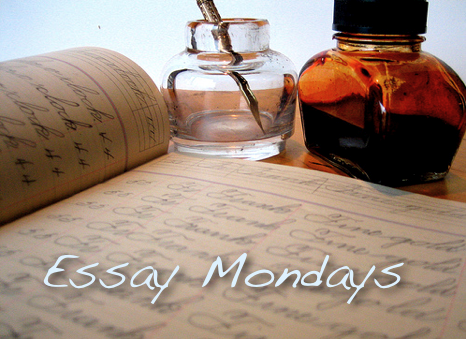
(Each week I read four essays from Philip Lopate's anthology The Art of the Personal Essay, and write about the one I find the most compelling.)
Things are racing right along here at Essay Mondays: we've already arrived at the 18th-century British essay boom! It's easy to spot, even if you skip Lopate's helpful author introductions, because the italicizing and capitalization habits of 18th-century Brits are not to be mistaken for those of any other group:
When we first put off from Shoar, we soon fell in with a Fleet of Gardiners bound for the several Market-Ports of London; and it was the most pleasing Scene imaginable to see the Chearfulness with which those industrious People ply'd their Way to a certain Sale of their Goods. The Banks on each Side are as well Peopled, and beautified with as agreeable Plantations, as any on the Earth; but the Thames it self, loaded with the Product of each Shoar, added very much to the Landskip.
The passage above is by Richard Steele, who penned three of the short pieces I read this week. As compared with Montaigne and the earlier authors Lopate includes in this collection, Steele's writing struck me for its journalistic quality. One can tell that the rise of the newspaper had happened in the interim, because Steele's style is much closer to what we think of as modern "media" writing: it's topical, conversational, and moves along at a brisk pace. He's working to keep the attention of someone who may have picked up his paper (he co-founded the Spectator with Joseph Addison) by happenstance, but who has the potential to become a repeat customer. As such, he walks a fine line between the desire to entertain and the urge, in true Enlightenment style, to educate. I found him most enjoyable when, as in the flaneur-ish piece "Twenty-four Hours in London," he lets the education portion of the proceedings slip his mind until the last few lines, and just gives me a peek of his peregrinations around the city - eyeing pretty girls, stopping in at pubs, and getting hit up for spare change in the street:
It happened so immediately, for at the corner of Warwick-Street, as I was listning to a new Ballad, a ragged Rascal, a Beggar who knew me, came up to me, and began to turn the Eyes of the good Company upon me, by telling me he was extream Poor, and should die in the Streets for want of Drink, except I immediately would have the Charity to give him a Six-pence to go into the next Ale-House and save his Life. He urged, with a melancholy Face, that all his Family had died of Thirst. All the Mob have Humour, and two or three began to take the Jest; by which Mr. Sturdy carried his Point, and let me sneak off to a Coach.
Clever schtick! (But seriously, why capitalize "Poor" in that story?)
I enjoy "roaming the city streets" type essays (Woolf's "Street Haunting" is, unsurprisingly, one of my favorites), so it was fun to read such an early example of this genre, and to see 1710s London through Steele's hearty, observant gaze.
Up next week: two essays by Dr. Johnson, one by Maria Edgeworth, and one by Charles Lamb. I've been meaning to check out Edgeworth's novels and Lamb's essays for ages, so I'm eager to get a taste of them here.
Badge photo courtesy of Liz West:

